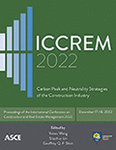Entertainment Space Design Based on Behavior Scene Theory: Taking Theme Park Space as an Example
Publication: ICCREM 2022
ABSTRACT
The entertainment industry opened by Disneyland theme park in the 1950s has shown a large-scale and systematic trend in recent years, and has rapidly developed and occupied the market. It includes a variety of entertainment industries such as theme park, cultural tourism, commercial entertainment, theme games, and art exhibitions. Its space shows a strong interactive, intimate, and narrative trend. How to improve the audience’s desire for independent interaction, strengthen the sense of experience, and complete the intimate narration through the creation of scene environment is a great challenge for indoor entertainment space. Based on the role and characteristics of behavior scene theory in entertainment space, this paper explores the universal law of human behavior in entertainment space. Through the exploration of theme park cases, this paper analyzes the theoretical basis of behavior scene in entertainment space from the aspects of space layout, scene construction, and user behavior, and sorts out and summarizes the design countermeasures and suggestions of theme park space.
Get full access to this article
View all available purchase options and get full access to this chapter.
REFERENCES
Ding, Y. (2019). “Research on localization design of international IP theme park: Taking Shanghai Disneyland as an example.” Architecture & Culture, (03), 71–72. (in Chinese).
Guo, Z. X. (2020). “Research on the application of green design concept in interior design of entertainment space.” West Leather, 42(17), 70–71. (in Chinese).
Hu, L. H., and Li, X. L. (2020). “Commercial space design from the perspective of environmental behavior: A case study of Hainan Changjiang Hongmian plaza commercial space design.” Art & Life, (04), 74–80. (in Chinese).
Hu, M. Y. (2017). “Brief analysis on the types and development trend of entertainment space design.” Tomorrow Fashion, (01), 12. (in Chinese).
Huang, Y. H. (2021). Study on the Relationship among Flow Experience, Positive Emotion and Behavioral Intention of Night Tourism in Theme Park: Taking Wuhu Fantawild Theme Park as an Example. Anhui University, Anhui, China, 68. (in Chinese).
Qiu, J. (2021). “Research on the introduction of the concept of ‘five-dimensional perception’ in the design of entertainment space.” China Cultural Heritage, 43(06), 29–30. (in Chinese).
Yang, X. Q. (2017). “Research on theme park science, technology and culture integrating landscape characteristic design: by taking Wuhu Fantawild Theme Park oriental god painting theme park as an example.” Journal of Hunan University of Science and Engineering, 38(07), 80–82. (in Chinese).
Zhang, J. F. (2019). “Study on public art space design of urban theme parks: Take Disneyland for example.” Industrial Design, (10), 75–76. (in Chinese).
Information & Authors
Information
Published In
History
Published online: Dec 15, 2022
Authors
Metrics & Citations
Metrics
Citations
Download citation
If you have the appropriate software installed, you can download article citation data to the citation manager of your choice. Simply select your manager software from the list below and click Download.
